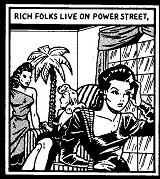In 1978, an artist named Mad Peck, nee John, designed what is now called The Providence Poster. The four-panel poster includes a composite of one-liners written by Peck and his friend, Les ‘Doc’ Daniels.
Through witticisms spoken over the years by the pair about their beloved Providence, or Prov, Peck captures truths about New England weather and the human condition.
Boy, he got that right. If you don’t like the weather, wait five minutes; it will change, as they say. Peck and Daniels’ comment is so twisted up, it’s funny. It rains two out of three days except during the rainy season. And when would that be? Oh, that would be when it snows.
Then the poster/artist turns serious.
How many people have been hurt by friends who betrayed them or left them at a moment when they were most needed? How many people have been screwed by those they trusted most? The artwork shows a terrible car crash. Is it a metaphor or a warning to the unwary tourist? If you look at a map of Prov, you will see that the caption can mean both:
But we all know there is more to life than friendship.
The poster was made in 1978, at a time when it was good to be rich in Providence. According to Ted Widmer, a Providence historian and current director of the Library of Congress’ Kluge Center, “Providence in the ‘60s was a broken-down factory town with a corrupt Democratic administration.” Peck came of age in the city and learned well.
But money isn’t everything either.
The contrast between the two panels is striking, and the two streets exist, appropriately, at right angles to each other in Prov:
Most of us DO live off hope. Not the kind of hope we express when we say, for example, "I hope the Bruins will win the Stanley Cup" but a deeper kind of hope, defined in the New Testament sense, as full assurance, or strong confidence that God is going to do good to us in the future.
In the Power Street panel, three women are lounging around looking bored. In the color version of the poster, Peck shows an interracial couple dancing in the Hope panel. There is hope for us all.
Peck is still active in Prov. In 2016, the Providence Journal called Peck 'a self-made man of peculiar taste,' whose job description falls somewhere between “renaissance man” and “hustler.” Over the 50-plus years he’s lived in Providence, the Mad Peck has been, at various times and in various combinations, a published comic book historian, nationally-read culture critic, beloved doo-wop DJ, commissioned poster and comic book artist, and television studies scholar, with early side trips through the electrical engineering and applied math departments at Brown University.
If all he ever did was make this poster, it would be enough.








